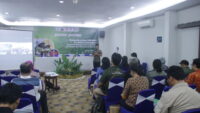
Established on June 20, 1975, Bina Desa is now celebrating its 48th anniversary. Since its inception, Bina Desa has remained steadfast in its commitment to empowering rural communities, nurturing the seeds of independence, empowerment, and the protection of the rights of underprivileged people, particularly women and marginalized individuals living in rural areas.
In honor of its birthday, Bina Desa organized the Bincang Syukuran 48th Bina Desa event on Saturday (08/07) at Kedai Tempo, under the theme of “Bina Desa’s Role in Rural Development.” The public discussion featured notable attendees, including Muhammad Fachri, S.STP, M.S, the Director of Advocacy and Village and Rural Cooperation from the Ministry of Village PDTT, and Rusdin M. Nur, representing the Secretary of the HR Development Agency and Village Community Empowerment of the Ministry of Village PDTT, who unfortunately couldn’t be present. Representing Bina Desa were Francis Xavier Wahono, B.SC., Ph.D., serving as the Board of Trustees of the Bina Desa Foundation, and Lily Noviani Batara, an activist for Natural Farming and Food Sovereignty.

The event commenced with an opening speech by Dwi Astuti, the Chairperson of the Bina Desa. She highlighted Bina Desa’s journey, emphasizing its mission to uplift marginalized communities, particularly those in rural areas. Collaborating with regional civil society organizations in Java and Sulawesi, Bina Desa focused on community organizing with Musyawarah (group discussion) as its guiding principle. These efforts have resulted in the establishment of several national-level civil society organizations, showcasing the positive impact of Bina Desa’s work.
“All members of Bina Desa understand that the path we have chosen presents its own challenges, as we often diverge from the approaches taken by many national civil society organizations. Nevertheless, we persevere, guided by our unwavering dedication,” remarked Astuti.
The establishment of Bina Desa traces back to the active participation of several individuals who were concerned about rural issues during the Development of Human Resources in Rural Asia (DHRRAW) workshop in Bangkok, Thailand, 49 years ago. After further consolidation, INDHRRA, later known as Bina Desa, came into being. This institution has been consistently generating innovative ideas and concepts of empowerment, implementing strategies and forms of assistance that have even inspired policymakers, particularly within the Ministry of Villages, which has adopted the term “Community Organizer.”
As FX. Wahono highlighted in the 48th Bina Desa journey diagram presentation, “During the Orde Baru (President Soeharto.red) era, Bina Desa and the Government had differing approaches. The government prioritized physical development, while Bina Desa focused more on human-centered development. Our efforts were primarily campaigns and promotions to raise awareness among all parties, including the government, about the fundamental needs of rural development.”
He further explained that Bina Desa gradually began organizing grassroots initiatives, advocating for Agrarian Reform, raising awareness about transitioning from organic farming to natural farming, promoting gender equality and social inclusion, among other issues. The passage of the Rural Law Constitution in 2014 marked a significant shift away from the development style of the Orde Baru era.

According to Muhammad Fachri, the Ministry of Villages continues to strive for the active involvement of rural human resources in village-level deliberation forums, aiming to realize bottom-up development. Law no. 6 of 2014 states that villages can independently manage their own funding. However, practical implementation still faces challenges and shortcomings.
Muhammad Fachri added that, as part of their efforts to promote village development, the Ministry of Village PDTT, in collaboration with the ASEAN Secretary, AsiaDHRRA, and Bina Desa, is jointly planning the SOMRDPE master plan.
Such collaborations can also be facilitated through the village assistant program. As explained by Rusdi M. Nur, “Community Organizer (Rural Assistant from Ministry of Village in Indonesia) have two main tasks: increasing participation and implementing rural community empowerment. The biggest challenge to date is the extensive area of assistance, with one facilitator covering 2 to 4 villages, which limits the optimal delivery of assistance to the communities. This is where civil society organizations like Bina Desa can play a crucial role in supporting community empowerment.”
During the event, Rusdin M. Nur expressed his hope for increased collaboration between Bina Desa and the government, as they share similar perspectives. This marks a departure from the past, where civil society organizations and the government were often at odds with each other.
Lily Noviani Batara also echoed this sentiment, emphasizing Bina Desa’s noble ideals. She highlighted the importance of giving a voice to the Rural Swabina Community (KSP), which consists of minority and marginalized groups. The challenge lies in ensuring the active involvement of KSPs in village development planning meetings and enabling them to become decision-makers within the village. By including women, youth, small-scale farmers, fishermen, and marginalized village communities in these forums, government development efforts can be more equitable and targeted.
Furthermore, Lily emphasized the significance of the village as a place of learning, not just about nature, but about all aspects of life encompassing both humans and nature. It is essential to collectively remember that the village is a source of life that must be protected.

As the event drew to a close, renowned rock music artist Roy Jeconiah (Jecovox Band) made an appearance, offering his support and encouragement to both offline and online participants of the discussion.
Happy anniversary, Bina Desa! May you continue to uphold the spirit of struggle alongside rural communities. Long live the struggle! [/RF]












